WHAT DO DEADLIFTS, squats, rows, slams, and even overhead presses all have in common? They all depend on the stability and strength of your core.
A strong base requires strong abs. This muscle group does so much for you. They help you bend, twist, turn. They protect your inner organs, and even help you sneeze and cough. Even when you’re not thinking about it, your abs are helping you brace and protect your spine— especially during your other big compound lifts in the gym.
Many guys might lazily toss in a set or two of situps at the end of their gym session, thinking that’s enough (probably more in hopes of exposing a six-pack than building strength). We don’t blame you if that’s the case—one of the most obvious reasons to incorporate ab exercises into your routine is to carve out a chiseled midsection. To have both a strong core and washboard abs, however you need a well-rounded routine that hits all of your abdominal muscles and the multiple functions of your core.
Here’s a curated list of our favorite core exercises to do just that. These ab exercises will help you build the bulletproof, dynamic core you’ve always wanted, and make you better at just about everything you do.
The 18 Ab-Strengthening Exercises
Plank
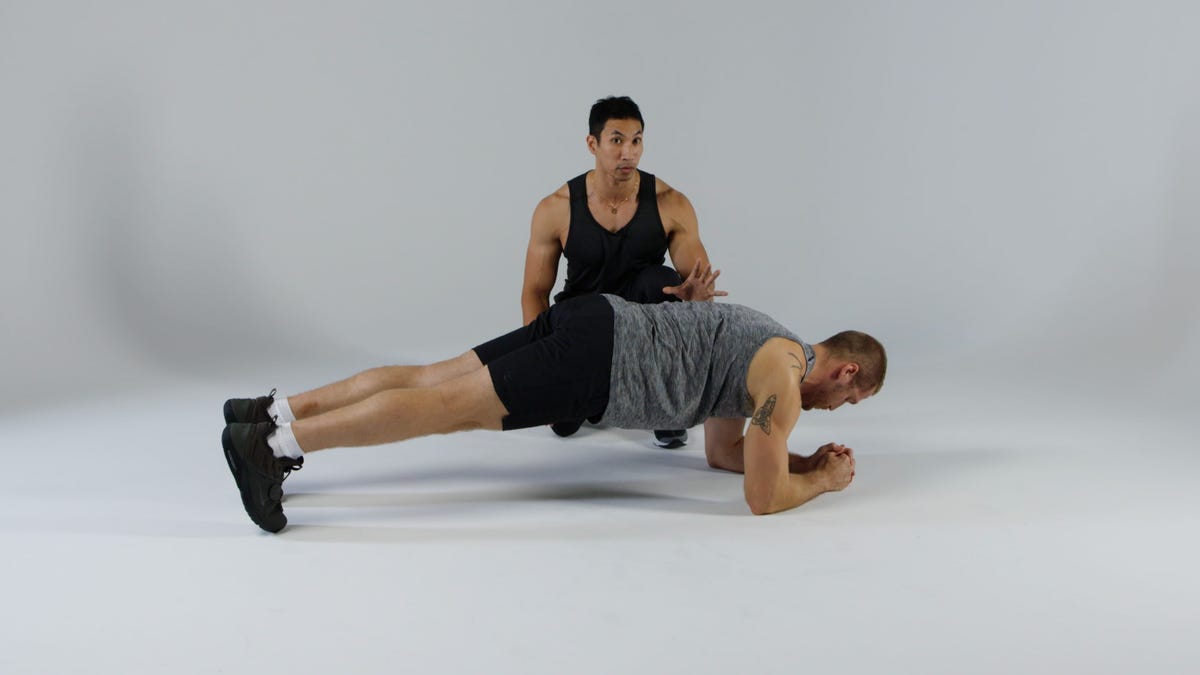
Why: You’ve probably used planks in your workouts before. They’re great to hone bracing, an important core function. But you need to make sure that you’re doing them right.
How to Do It:
- Get down on the ground. Stack your elbows directly beneath your shoulders and extend your legs. Rest your weight on your elbows and your toes.
- Squeeze your glutes and core to create full-body tension. Think about pulling your belly button into your spine.
- Contract your low back, lats, and rhomboids. Your back should form a straight line; don’t let your pelvis dip down or your butt to rise up.
- Face your gaze face down, which keeps your neck in a neutral position.
Sets and Reps: 4 sets of 30 second to 1 minute holds
For more tips, check here.
Mountain Climbers
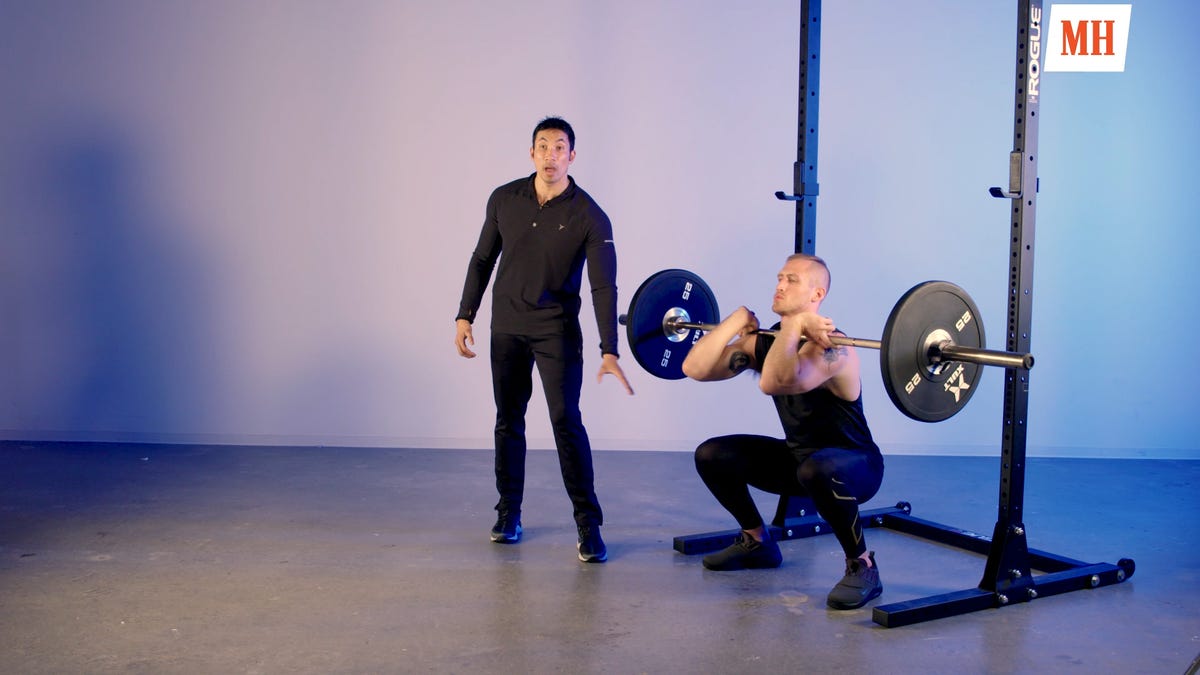
Why: Mountain climbers still challenge you to brace your core, but also adds movement and an extra athletic component.
How to Do It:
- Set up in a high plank (pushup) position, with your hands stacked directly below your shoulders, elbows turned out, and feet just wider than hip-width apart. Your shoulders should be higher than your hips. Think of this as an athletic position.
- Squeeze your shoulders, core, and glutes to create full-body tension. Look down at the floor, keeping your head in a neutral position.
- Drive one knee up high to your chest, as if you were running. Return your leg to a straight position. Repeat with the other leg.
- Continue alternating reps, working to keep your torso in position with your shoulders higher than your hips. Brace your core to stay level.
Sets and Reps: Start with 3 to 4 reps of 30 seconds
For more tips, check out this guide.
Hollow Hold
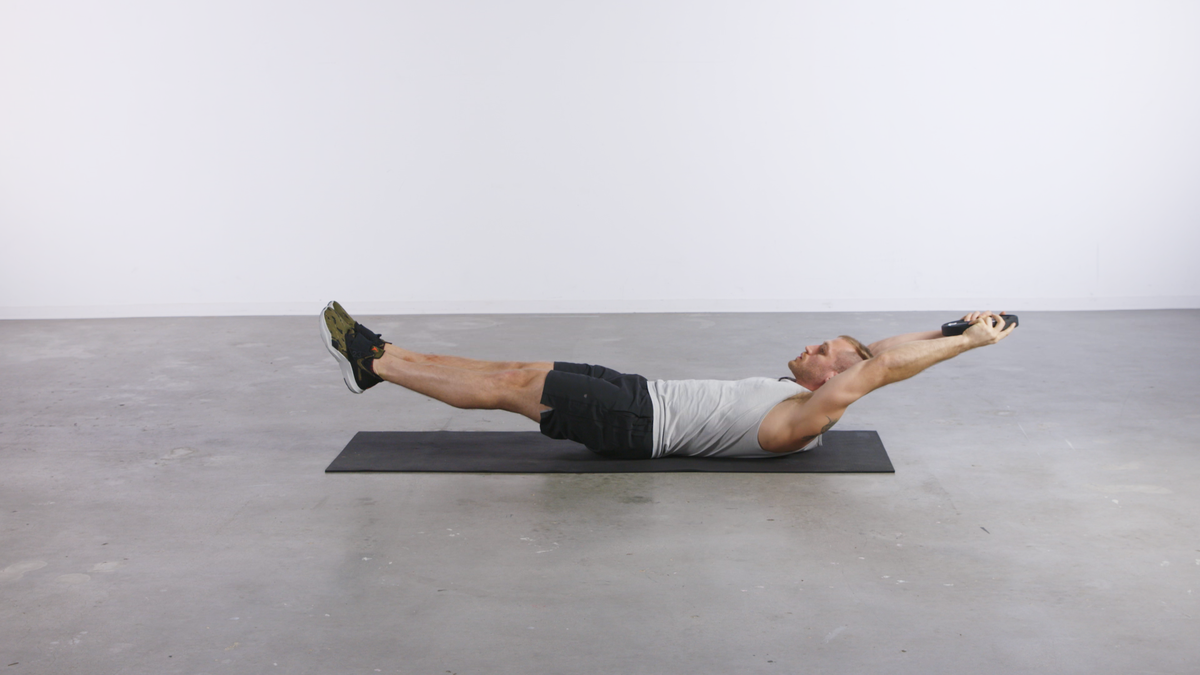
Why: The hollow body position is a basic gymnastics maneuver for a reason: it’s extremely efficient at building core strength and fine-tuning proper posture.
How to Do It:
- Lie on the ground (preferably on a yoga mat). Get into an “egg” shape—raise your feet off the floor and hug your knees to your chest, lifting your shoulders off the floor.
- Drive your lower back into the floor. This is key for the duration of the movement.
- Extend your legs out as far as you can, straightening the knees and keeping your feet raised a few inches off the floor. Extend your arms out behind your head, keeping your shoulders raised off the floor.
- Squeeze your abs and glutes to create full body tension. Hold this position, keeping your lower back planted on the floor.
Sets and Reps: 3 to 4 rounds of 45 seconds to a minute.
Check here for more detailed tips.
Side Plank
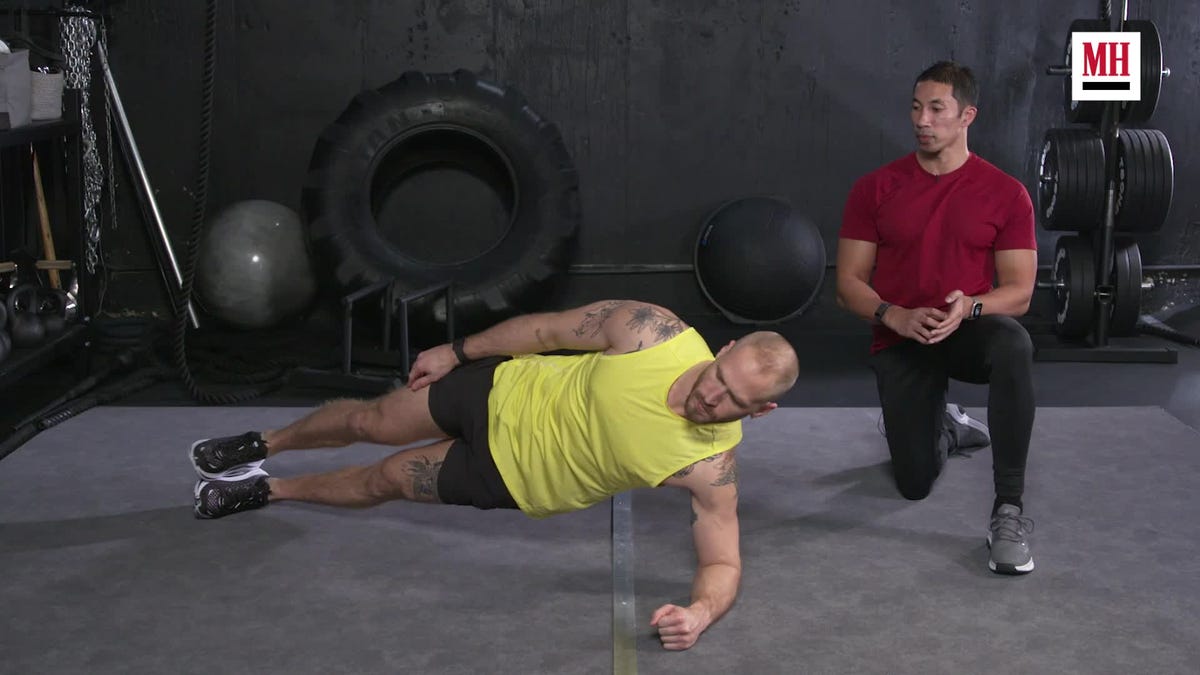
Why: Flip your plank to change your focus to the obliques, the muscles that run along the sides of your core.
How to Do It:
- Lie on one side with your legs straight and prop up your upper body on your forearm. Raise your hips so your body forms a straight line from your head to your heels.
- Brace your abs and squeeze your glutes to hold the position.
- If you want to make it harder elevate your feet or add a torso rotation.
Sets and Reps: 3 rounds of 40 second holds
Bird Dog
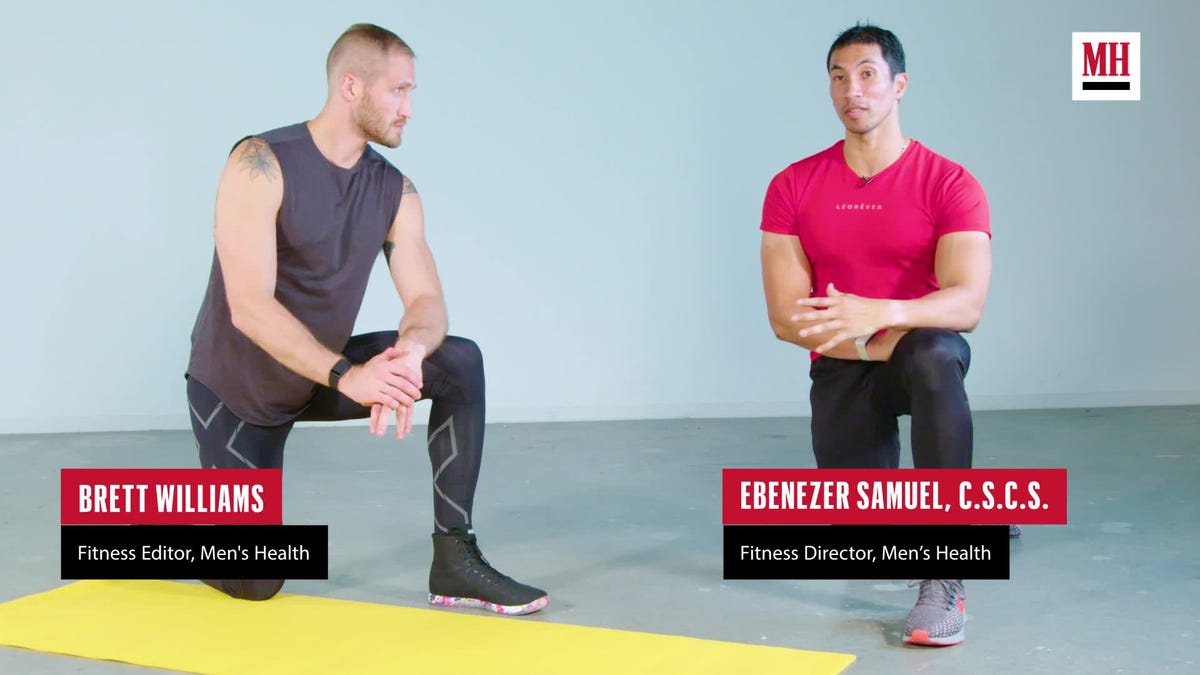
Why: This deceptively tough ab exercise is all about stability and focus. You might think of this as just a stretch, but you’ll have to work harder than you’d expect to make it worth your while.
How to Do It:
- Get into a four point stance, with both hands and feet on the ground.
- Make sure your spine is straight, with your shoulders stacked directly over your wrists and your knees in the same plane as your wrists. Keep your neck neutral.
- Squeeze your abs, then raise your opposite arm and leg straight up. Move slowly to prevent yourself from falling over and keep your shoulders and hips facing the ground.
- If that’s too much of a challenge, try to work through your limbs individually to master the balance.
Sets and Reps: 3 to 4 sets of 8 reps.
Check here for more.
Half-Kneeling Kettlebell Windmill
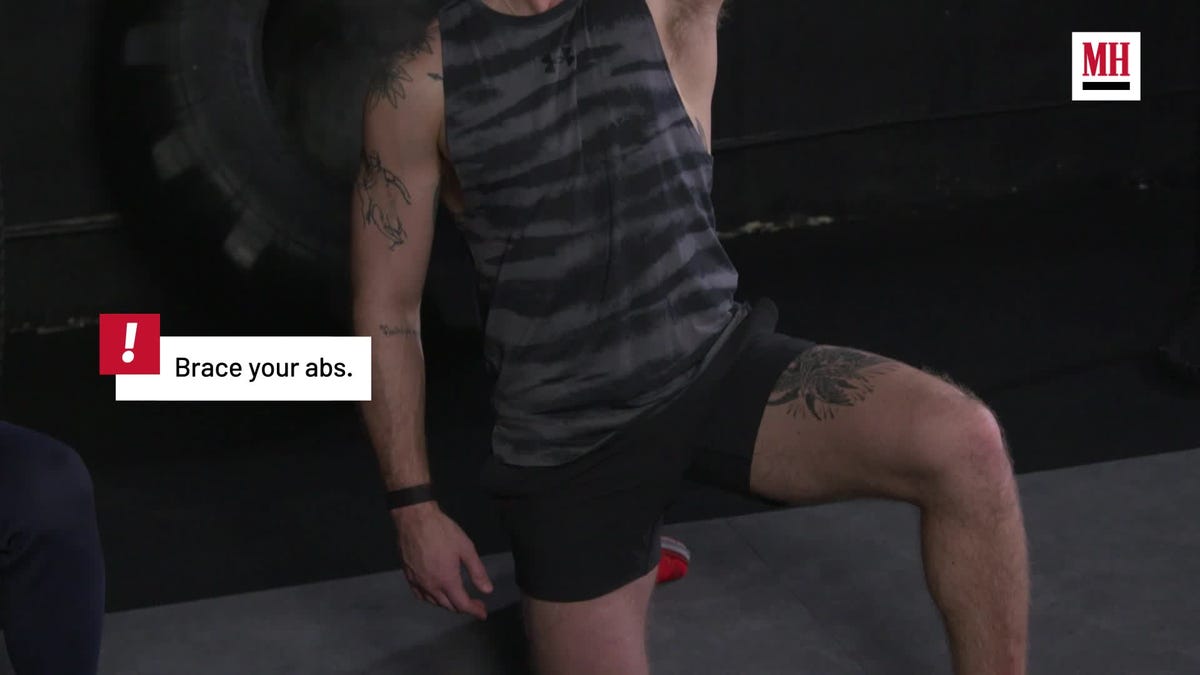
Why: This might be the best core exercise you’re not doing. You’ll brace your core, hone shoulder and hip mobility, and even add some rotation to your routine.
How to Do It:
- Start in a half-kneeling stance, slightly wider than usual.
- Press the kettlebell straight overhead. Keep your ribcage tight by squeezing your abs and glutes.
- Look up to the kettlebell, then push your butt back and rotate your chest open as you lower down to the floor. Keep the weight elevated.
- Reverse the movement to the upright position.
Sets and Reps: 3 sets of 6 to 8 reps
Ab Wheel Rollout
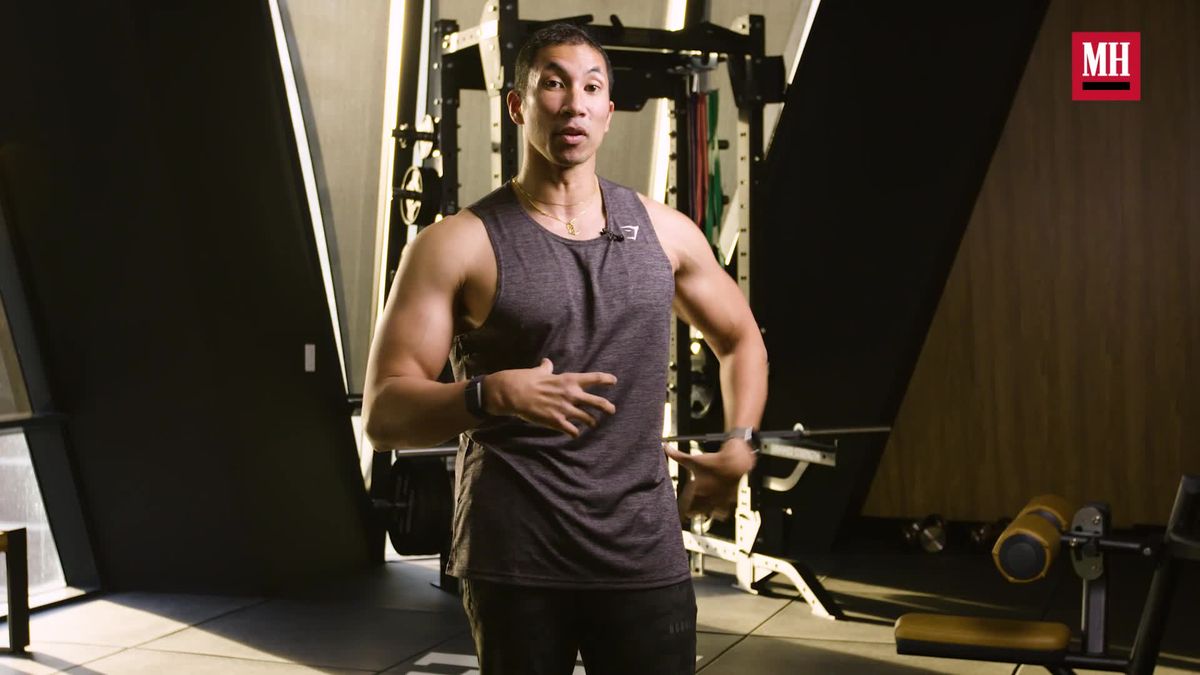
Why: This small but mighty gym tool gives you a chance to train anti-extension, a key function of your core. You’ll also get a nice shoulder mobility challenge, too.
How to Do It:
- Sit with a wide stance holding the ab wheel with both hands.
- Keep your head in a neutral position, looking at the ground directly in front of you. Squeeze your shoulder blades, abs, and glutes to create tension.
- Turn the pits of your elbows forward to activate your lats and putting your shoulders into external rotation.
- Round your back, then press into the floor to roll out as far as you can. Keep your back rounded and avoid any arch.
- Pause for a brief count in the fully extended position and squeeze your abs.
- Round your back to begin rolling the wheel back slowly. Make sure the wheel is moving before you shift your hips back.
Sets and Reps: 3 sets of 6 to 10 reps
Ball Slam

Why: This exercise is more than just an ab-burner—but it can be an effective and fun way to smash your core while you blow off steam.Make sure to use your whole body for the movement.
How to Do It:
- Pick up the ball with a deadlift motion, then raise the ball up with both hands as high as you can and lift up on your toes, allowing your feet to raise into triple-extension.
- Once you’ve reached the highest point, drive down into your heels, sit back into a squat, then swing your arms down to slam the ball into the ground.
Sets and Reps: Mix up the way you use the slam, for time or reps. Start with 4 rounds of 30 seconds on, 30 seconds off
Check out more details here.
Pallof Press
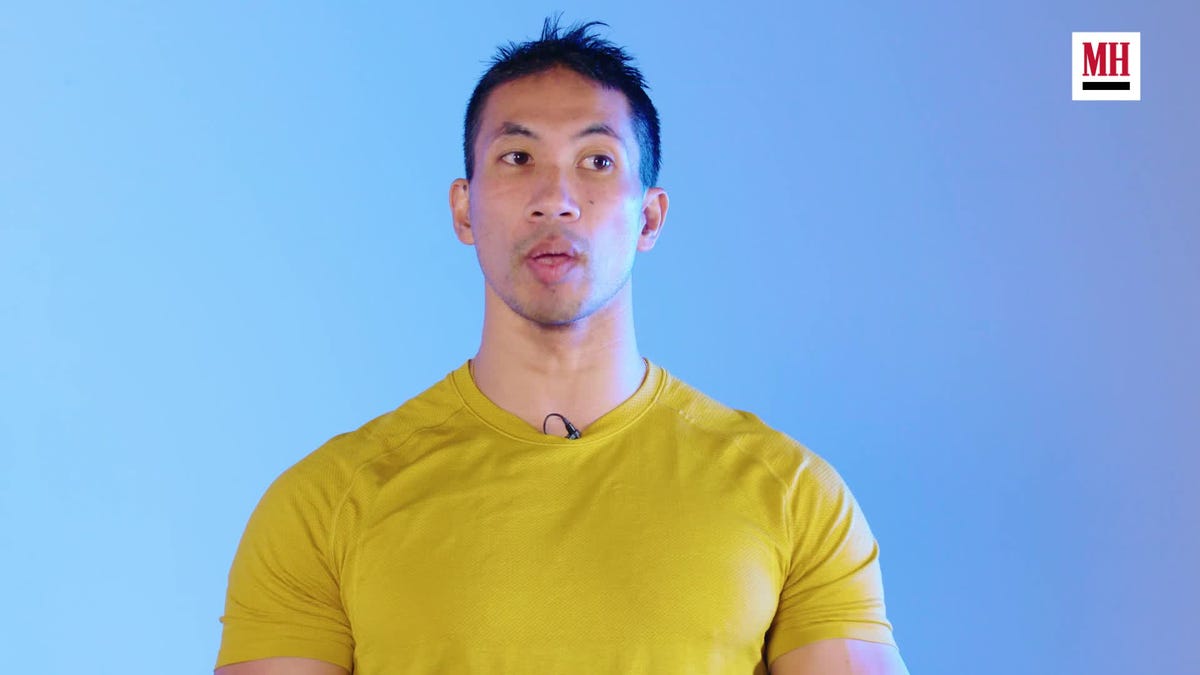
Why: The Pallof press uses tension created by a band or cable to make your core muscles fire, forcing them to work together as a unit.
How to Do It:
- Set up a cable machine or attach a resistance band to an anchor at a height so that you can grab it with both hands in a tall kneeling position.
- Kneel next to the anchor point and grasp the band or cable handles with both hands in front of your chest. You should be far enough away so that there is some tension in the band. Squeeze your glutes and core to create tension in your body.
- Look straight ahead and tighten up your shoulder blades. Extend your arms away from your torso. Fight the pull of the cable or band by keeping your glutes and core tight.
- Hold for a count, then return back to the starting position.
Sets and Reps: 3 sets of 8 reps
3-Step Core Getup
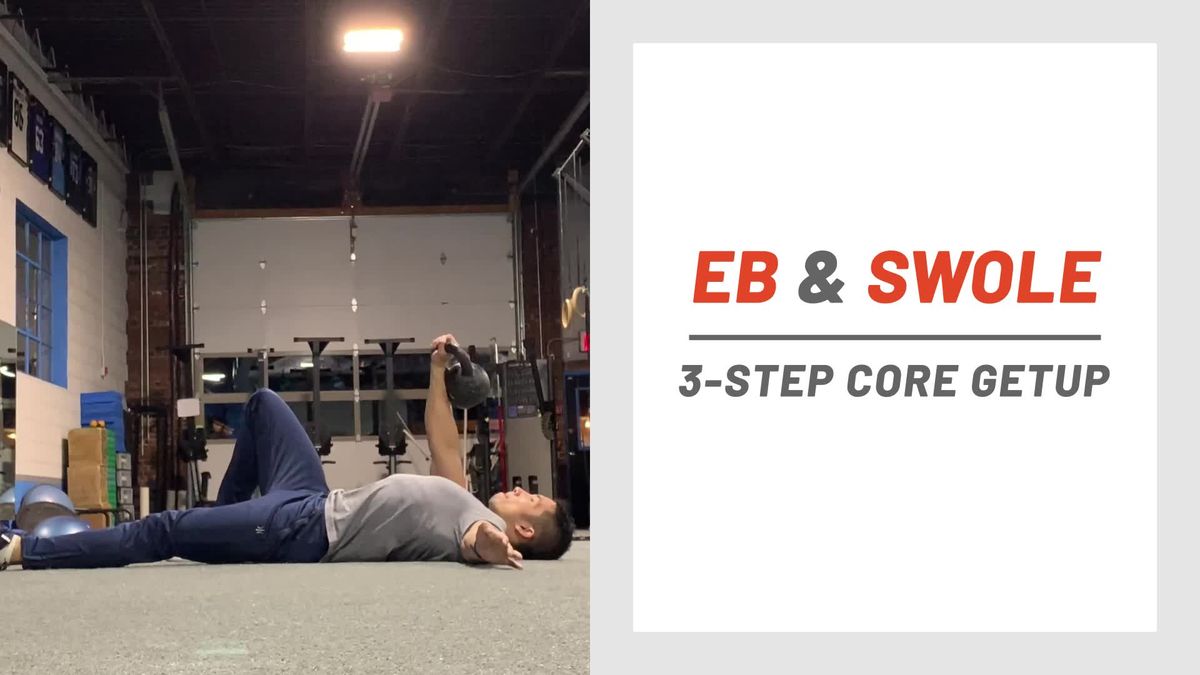
Why: The Turkish getup is a complicated, difficult move to learn—so if you’re not ready to step under the weight just yet, start with this simplified three-step version instead. It’s more focused on the core than the full movement, anyway.
How to Do It:
- Start in a lying position on the ground with the kettlebell in one hand, with that same side leg bent and the sole of your foot on the ground. Press the weight straight up, and extend the other arm out to the side with your palm facing down.
- Squeeze your abs to press your torso upward so your propped up on your elbow. Keep the weight elevated in the same position.
- Push off the ground with your off hand to straighten your arm. Keep the weight elevated in the same position.
- Lean on your arm and squeeze your glutes to push your hips off the ground as high as you can, aiming to create a straight line from your torso through your thigh. Keep the weight elevated in the same position.
- Reverse the motion to return to the bottom position.
Sets and Reps: 3 sets of 8 to 10 reps.
Cable Crunch
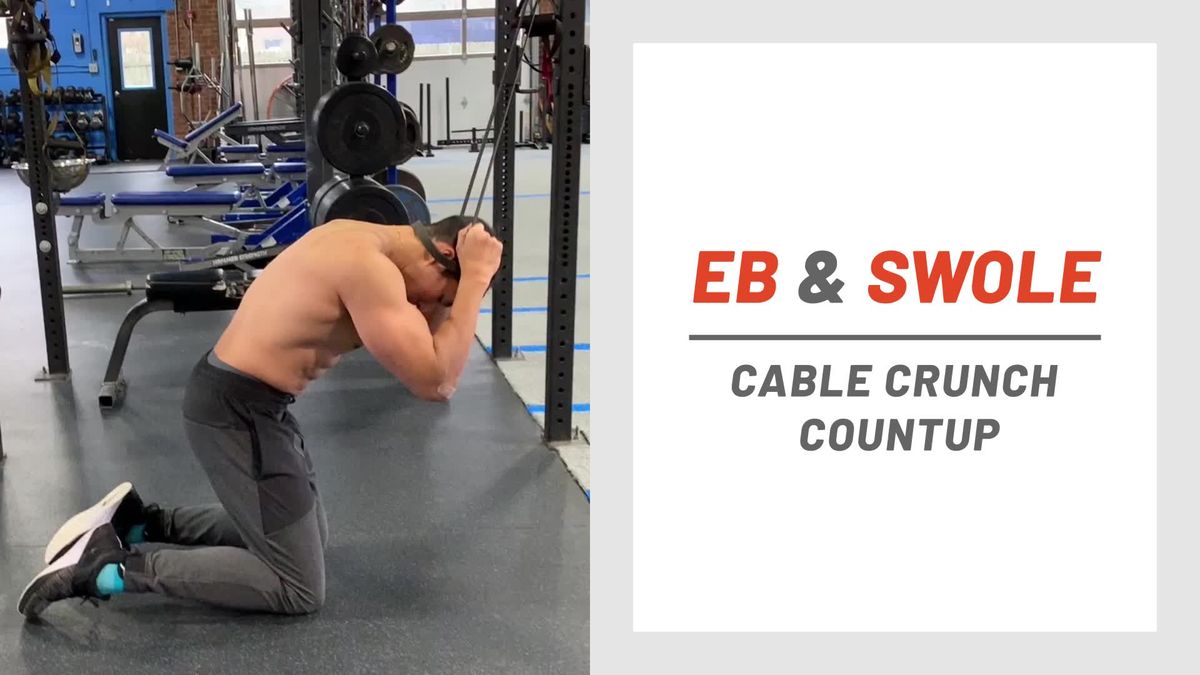
Why: Like other muscles, your abs need to take on a challenge from a load to really build up size and strength, so sticking to bodyweight-only workouts won’t do if you want real growth. You don’t need to bust out the heavy weights all the time though—resistance from bands can be effective, using moves like this cable crunch.
How to Do It:
- Attach the band to an anchor above you, like a pullup bar.
- Kneel down on the ground with your thighs perpendicular to the ground. Hold the end of the band on either side of your head at about ear-level.
- Flex your abs to hinge at the hips, pulling your elbows down to your knees. Rotate slightly to touch your left elbow to the right knee.
- Hold for 1 count, then rise up, keeping the hips stable.
- Repeat, this time touching your right elbow to left knee.
- For the next set of reps, add 1 second to the hold at the bottom. Continue up to 5-second holds.
Sets and Reps: 3 sets of count ups to 5 second holds
Copenhagen Plank
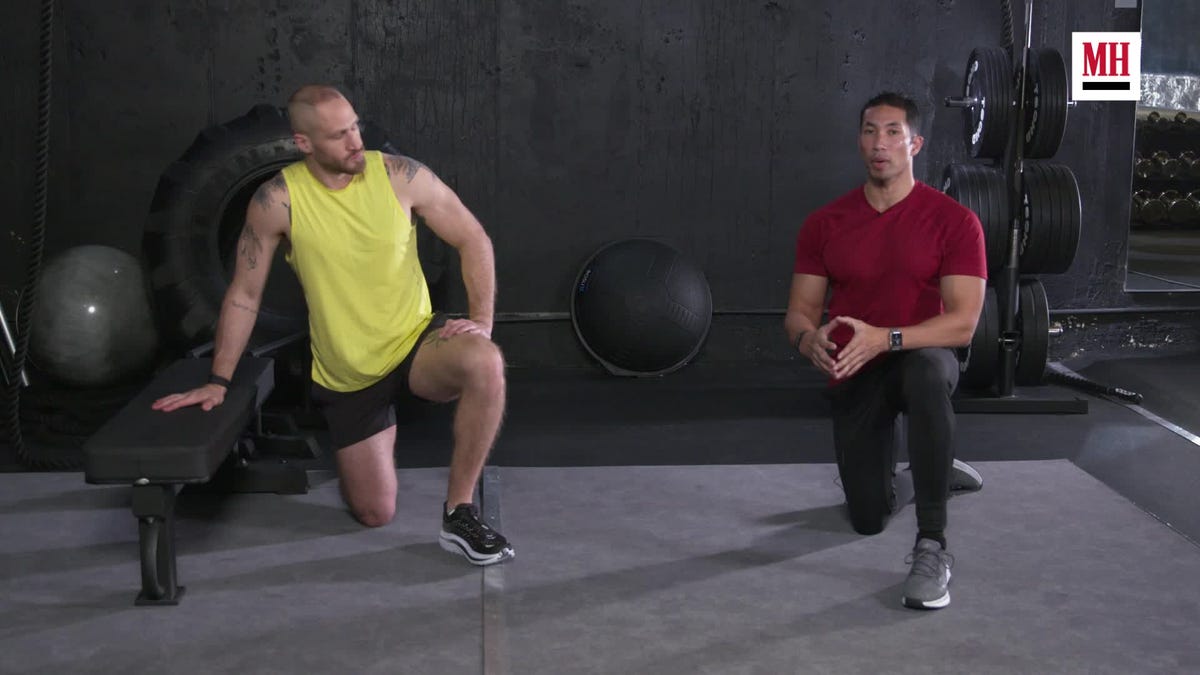
Why: This leveled-up side plank variation introduces elevation to make the bracing and anti-rotation challenge even more difficult. Your hips will be pushed to their limits, too.
How to Do It:
- Get into a side plank position, with your outside foot up on the bench. Squeeze your upper abs, hips, and obliques to keep your hips up and your spine straight.
- For the standard variation, keep the leg closer to the ground off the floor.
- If you want an additional challenge, you can give the version of the Copenhagen plank add the knee drives with the lower leg.
Sets and Reps: 4 sets of 5 to 20 second holds
Dragon Flag
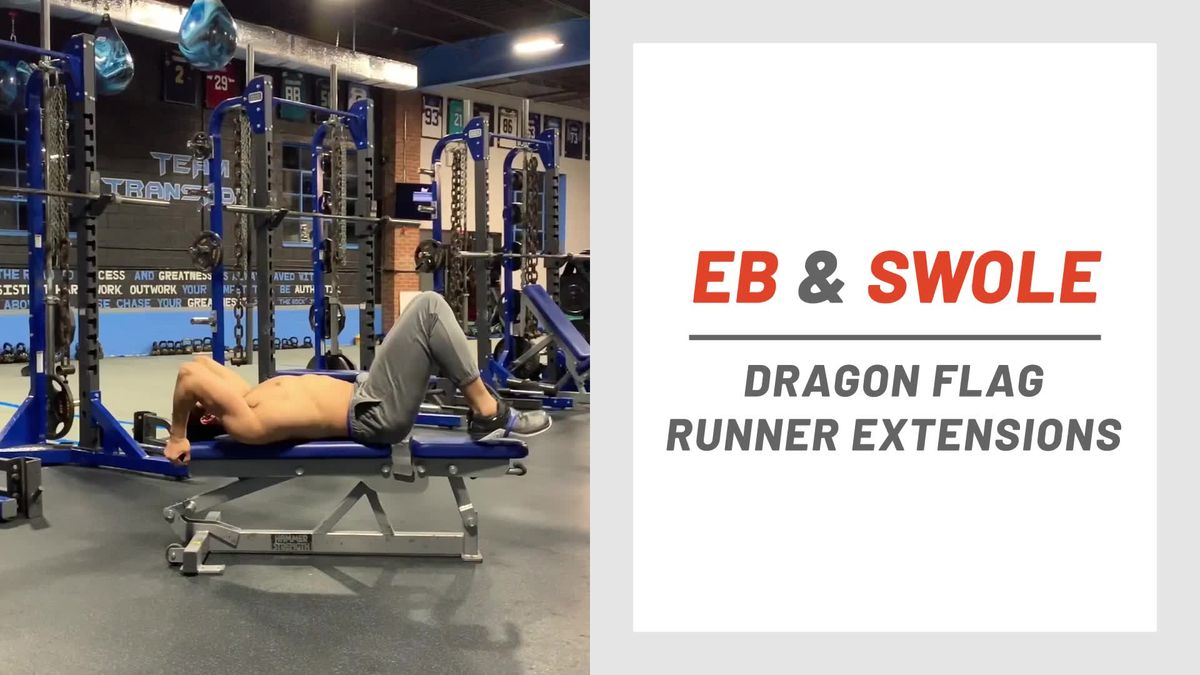
Why: An exercise that looks incredibly cool and crushes you core—what’s more to love?
How to Do It:
- Lie with your back flat on the bench.
- Reach your hands behind your head to support yourself, then lift your legs and lower back straight up.
- Keep your shoulders down on the bench and create a straight line with your body, from the base of your neck to your toes.
- Squeeze your abs to keep your posture in line.
- Hold for the recommended period.
Sets and Reps: Try 3 rounds of 30 seconds
Hanging Leg Raise
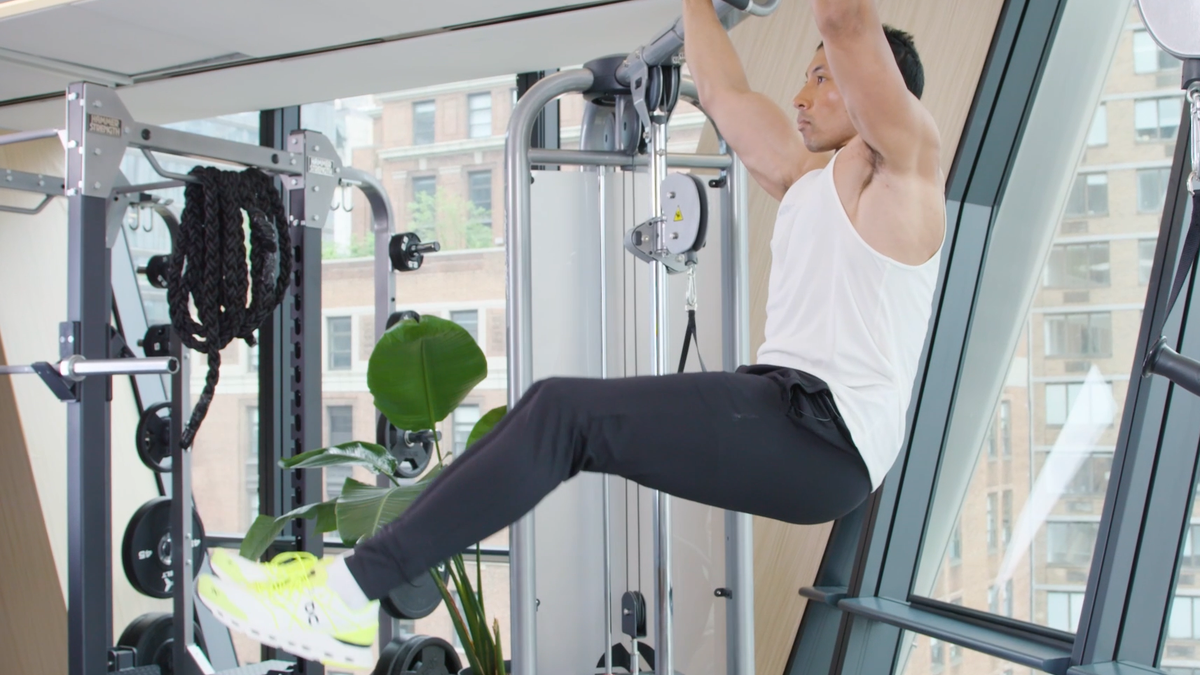
Why: This ultra-tough exercise challenges you to contract your abs from a hanging position.
How to Do It:
- Grab the bar, making sure that your palms are all the way over the bar. Squeeze your shoulder blades, abs, and glutes. Your legs should be slightly in front of your torso.
- Bend your knees, then curl your legs up, using your abs and hips to drive the movement. Your butt should raise up, and your torso should curl.
- Lower back down to the starting position, maintaining tension.
Sets and Reps: 3 sets of 8 to 12 reps
Plank Pull
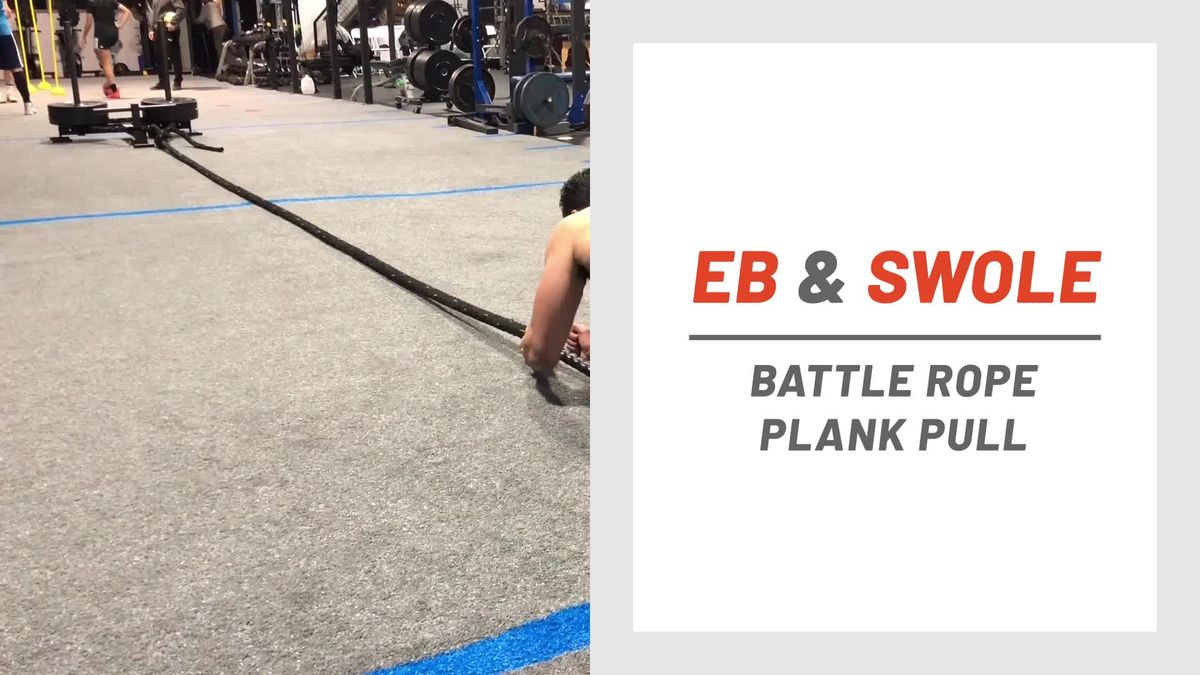
Why: You already know how to take on the plank. Make it even more difficult and add a dynamic element to the static move by pulling some weight. The dual nature of this exercise means that you won’t just be working your core—your arms and lat muscles will be challenged, too.
How to Do It:
- Get in a forearm plank position, with the rope between your arms. You should be as far from the sled as possible.
- Reach in front to pick up the rope with one hand, maintaining the plank position. Squeeze your glutes and keep your hips steady.
- Pull the sled in toward yourself, keeping your torso facing the ground. Make sure to keep the arm you’re pulling with tight to your body and avoid flaring your elbow out; think of it as a fully vertical movement, like a pullup.
- Continue pulling until you bring the sled all the way in.
- Reposition the rope and repeat with the other arm.
Sets and Reps: 3 sets per arm
L-Sit
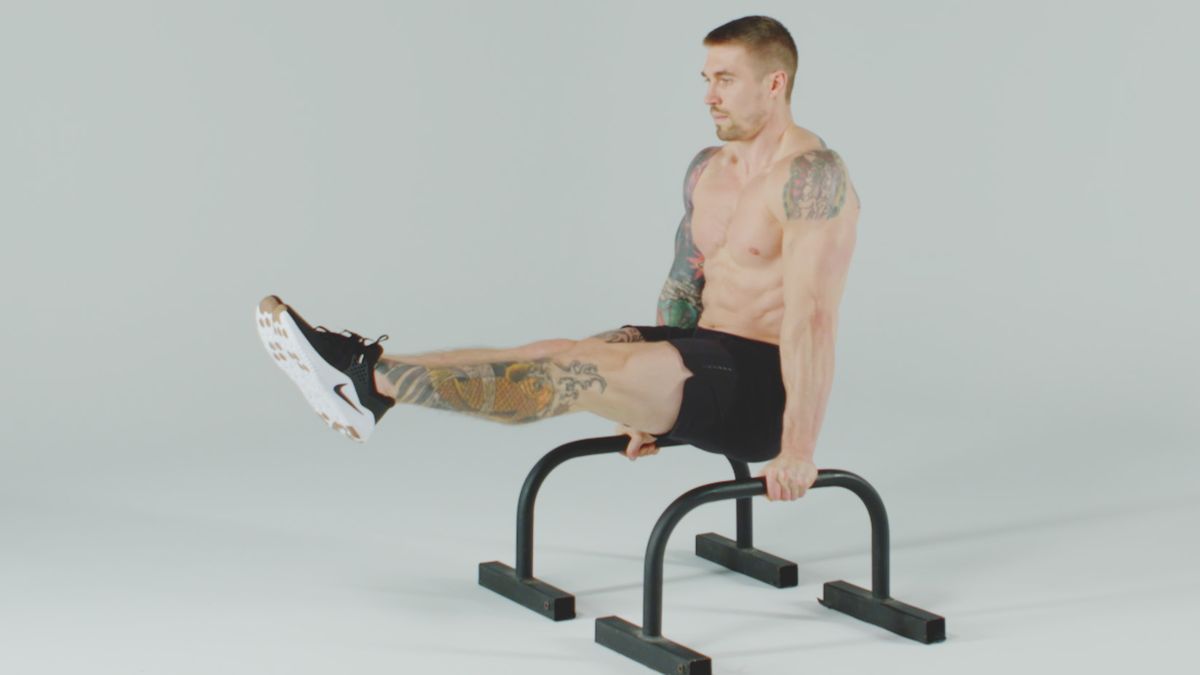
Why: Ready to pull off a seriously impressive, abs-centric maneuver?
How to Do It: The L-sit is tough, but you can learn how to do it if you follow trainer Jay Maryniak’s progression here.
Sets and Reps: Working up to master the move is a workout in and of itself, but you should only do it once or twice a week once you have it down.
Russian Twist
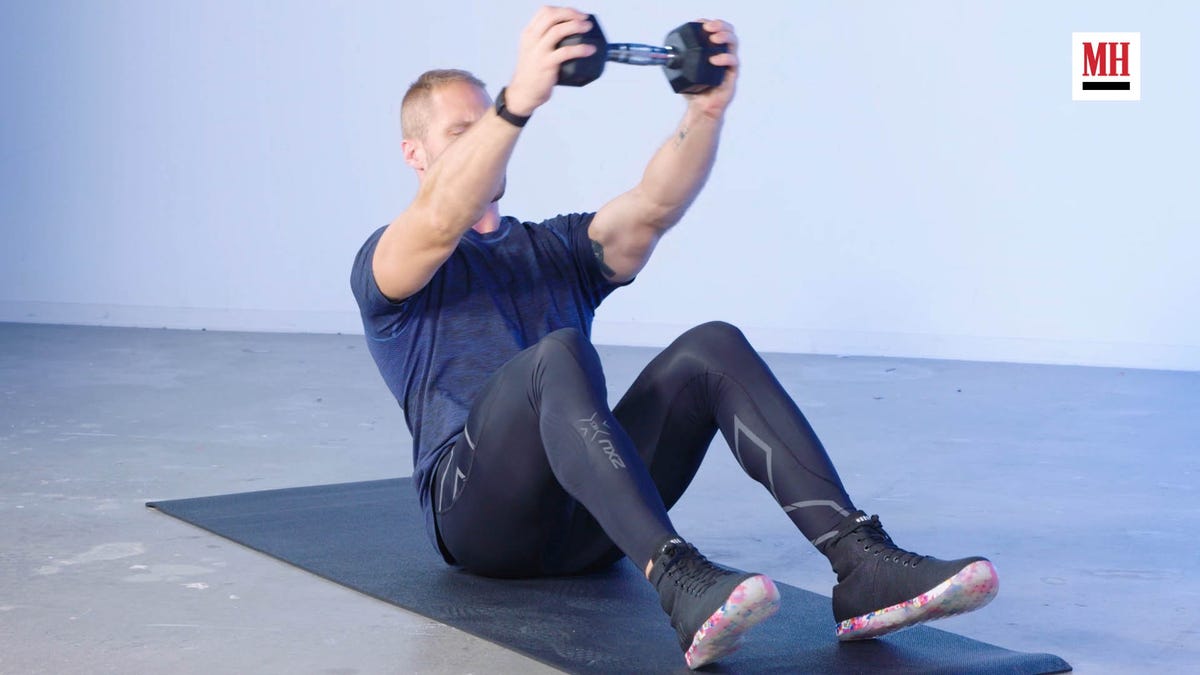
Why: The Russian twist is a classic core move that pushes your abs to create rotation, and it’s a move you can do anywhere.
How to Do It:
- Sit down on the floor or on a mat, keeping your feet on the ground. Your heels should stay on the floor, but your toes can be off the ground. Squeeze your glutes for stability.
- Lean back, forming a right angle from your torso relative to your thigh.
- Raise your arms out in front of you. Look up at your hands (and the weight, once you progress to working with a load)—you’ll keep your gaze trained there throughout the movement.
- Rotate your torso from one side to the other, pausing for a beat in the middle position between each rep. Move slowly, and keep your eyes on the weight. Keep the load out as far as possible to keep the lever long to challenge your abs. Only work within you range of motion; once your hips and knees begin to shift, you’ve gone too far.
Sets and Reps: 3 sets of 15 to 20 reps
TRX Reach Row to Perfect Row
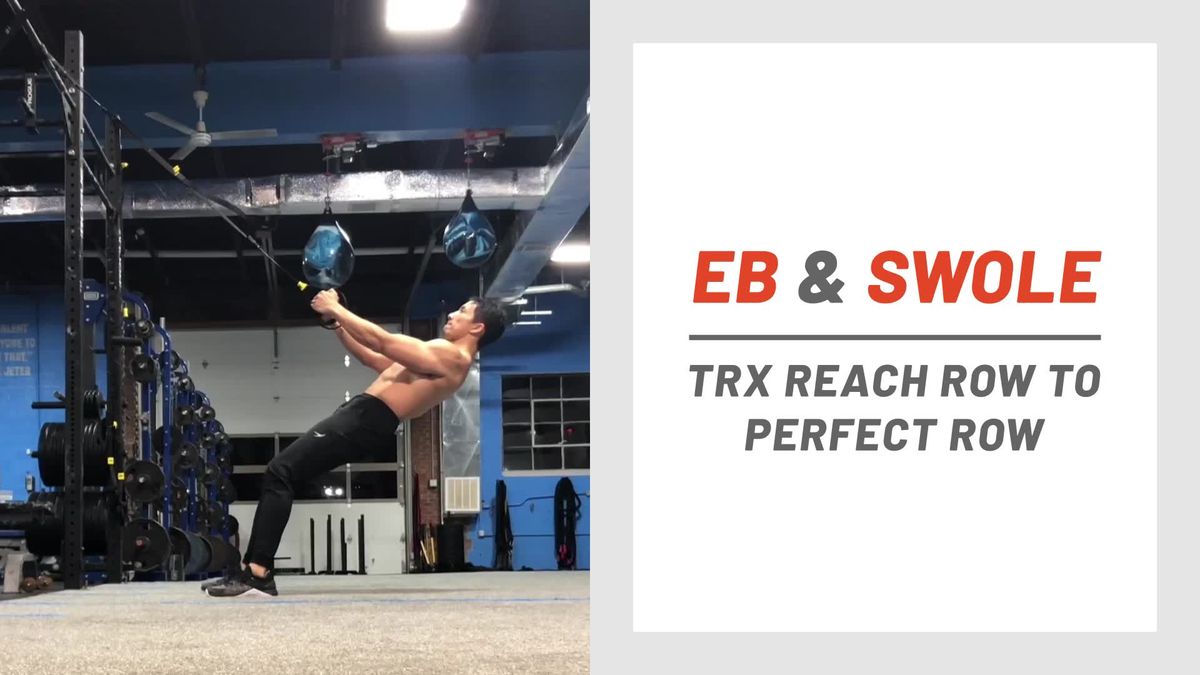
Why: Among your core’s key functions are these two ideas: It’s supposed to create torso rotation, and resist rotation. You’ll do both in this TRX move, a back move that’ll fire up your abs too.
How to Do It:
- Stand in front of the setup and grab one TRX handle. Lean back, extending and straightening the arm holding the strap so that it supports your weight (remember Eb’s tip about positioning for difficulty from above). Squeeze your glutes and core to keep your torso straight.
- Straighten your free arm out in front of you so that it’s even with the other.
- Extend your free arm back as far as you can behind you, reaching toward the ground to create a “T” shape. Maintain your torso’s position as much as possible.
- Squeeze your back and core and hinge at your elbow to row yourself back up with the arm holding the handle, reaching as high up the TRX straps with your off arm as you can.
- Maintain your torso position as you extend your arm holding to handle to the starting position, keeping your off arm pointed straight ahead.
- Squeeze your back and core and hinge at your elbow with the arm holding the handle to perform a standard one-arm squeeze row. That’s one paired of reps.
Sets and Reps: 3 sets per arm
Which Muscles You Target With Ab Workouts
You’ll target muscles like the obliques, transverse abdominis, and rectus abdominis. But your core is also composed of your spinal erectors, glutes, and other smaller muscles, too. These are essential for long-term gains and healthy function.
Benefits of Ab Workouts
By building the full core, we can improve across the board in other lifts, sports, and day-to-day life. Far too often, we think of the core as just “one thing” (a.k.a. the abs, your classic six-pack muscles), but it’s so much more. MH fitness director Ebenezer Samuel, C.S.C.S. says this means inviting your lower back extensors and glutes to the party, too. “Just training your abs only does so much,” he says. “You want a nice balanced core to stabilize your entire body, and make you more athletic, too.”
Let’s break down our absolute favorite ab exercises to include in your ab workouts. These ab exercises will help you build the bulletproof, dynamic core you’ve always wanted, and make you better at just about everything you do.
